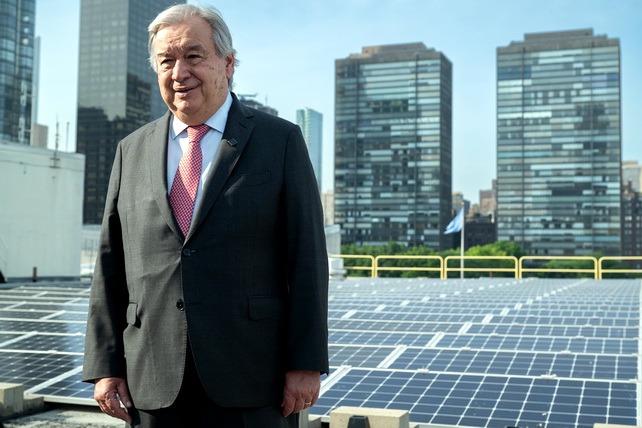
UN Secretary-General: “A Moment of Opportunity – Accelerating the Clean Energy Era”
Photo: UN Photo Mark Garten
UN Secretary-General: “A Moment of Opportunity – Accelerating the Clean Energy Era”
Tashkent, Uzbekistan (UzDaily.com) — Energy has always played a pivotal role in the progress of humanity — from the discovery of fire to nuclear power.
Today, according to UN Secretary-General António Guterres, the world stands on the threshold of a new era: the era of clean energy.
Last year, nearly all growth in energy capacity came from renewable sources. Investments in clean energy reached US$2 trillion, surpassing fossil fuel investments by US$800 billion. Solar and wind energy are now the most affordable in the world, while the clean energy sector is generating jobs, boosting economies, and driving development — despite the continued subsidies for fossil fuels.
Guterres stresses that clinging to outdated energy systems is not protecting the economy — it is sabotaging it. Clean energy, on the other hand, ensures energy independence: unlike fossil fuels, sunlight and wind are not subject to price volatility or geopolitical risk.
Moreover, clean energy development is expanding electricity access to hundreds of millions of people, especially through decentralized solar solutions. However, despite the inevitability of the energy transition, it remains too slow and inequitable. Developing countries are lagging behind, and global emissions are still rising.
To shift this trajectory, the UN Secretary-General has outlined six key action areas:
First, national commitments. Every country must submit new climate plans (NDCs) aligned with the goal of limiting global warming to 1.5°C and clearly focused on a clean energy pathway. The G20’s leadership is especially critical, given its 80% share of global emissions.
Second, modern energy systems. Without new grids and storage solutions, the full potential of renewables cannot be realized. For every dollar invested in renewables, at least one dollar must go to infrastructure.
Third, renewables-driven growth. Rising electricity demand — including from data centers — must be met by renewables. Major tech companies should commit to using clean energy.
Fourth, a just transition. Support must be provided to regions dependent on fossil fuels, and supply chains for critical minerals must be reformed to eliminate exploitation and environmental destruction.
Fifth, trade as a lever. Clean technology supply chains should be diversified, tariffs on green tech reduced, and investment agreements updated to reflect the new energy landscape.
Sixth, financing. Developing countries must gain better access to funding. In 2024, Africa received only 2% of global renewable energy investments — despite its immense potential. The global community must ensure fair debt policies, reform credit rating methodologies, and expand the role of multilateral development banks.
Guterres concludes with a powerful call to action: “We stand at the threshold of a new energy era. We now have the opportunity to accelerate a global shift. Let’s seize it.”